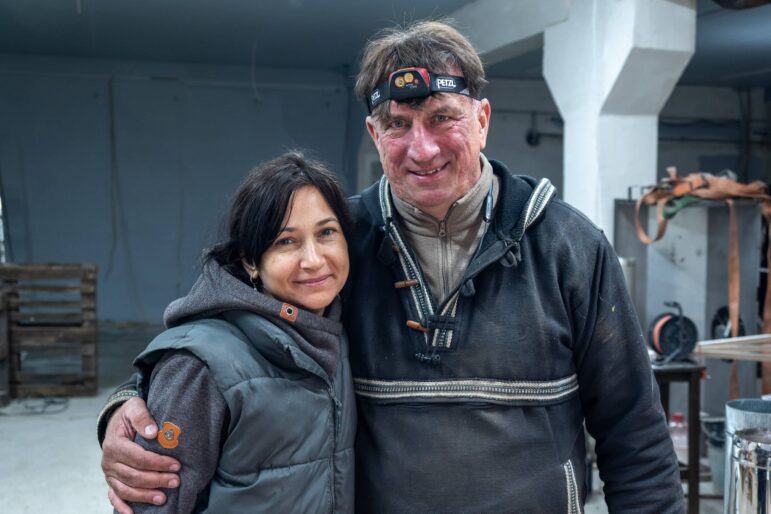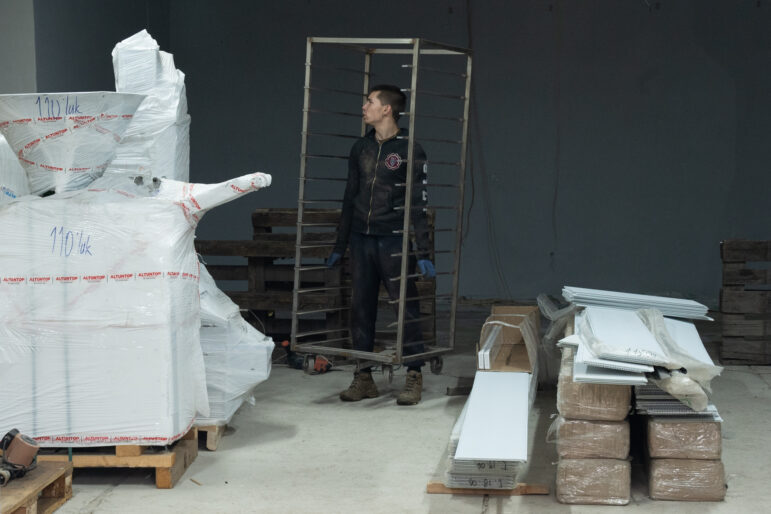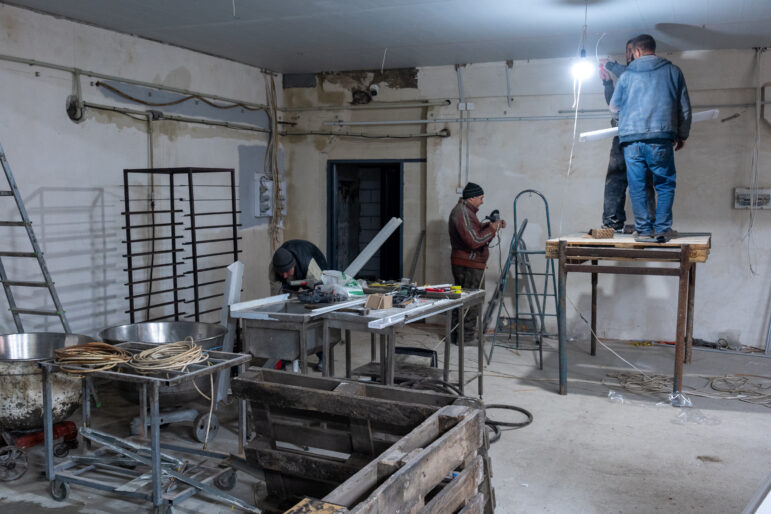Oleh's Resilience: Rebuilding Hope, One Loaf at a Time
In Slovyansk, chaplain and humanitarian worker Oleh Tkachenko stands by his bakery, a symbol of resilience and community service. Forced to flee Pokrovsk—a city devastated just 70 kilometers to the south—Tkachenko brought with him what little bakery equipment he could. Russian forces had advanced too close to his home, leaving him no choice but to relocate his family and his mission. Supported by Koridor UA, a partner of Nonviolent Peaceforce (NP), he found home in Slovyansk—the same city where his journey as a humanitarian began amidst the conflict of 2014.
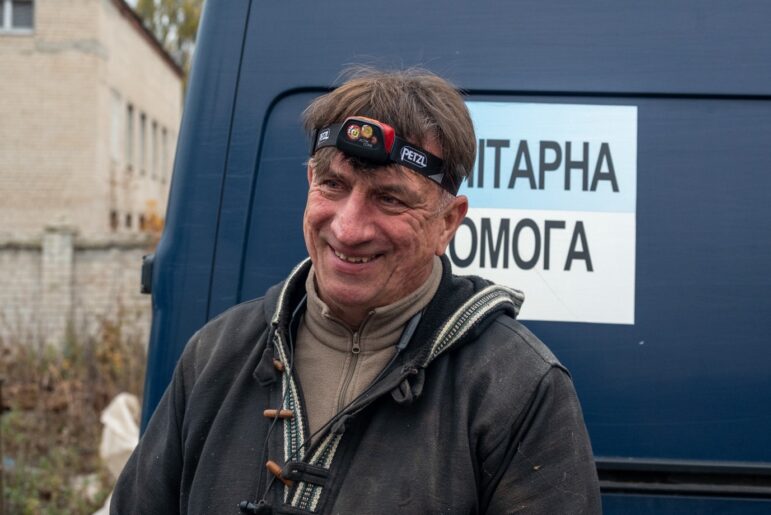
From Loss to Liberation and the Bakery’s Beginning in 2014
In 2014 Oleh Tkachenko, a chaplain and a baker, moved to the town of Slovyansk after an awful tragedy—his eldest daughter had died.
But by the Spring of that year tragedy reached his home again when a separatist group captured the town, and then fighting ensued with Ukrainian forces. “By spring 2014, we just started to get back to normal when it happened. You wake up and see ... people with weapons have captured the town,” recalls Oleh. He describes those times as filled with prayer and uncertainty.
After liberation of Slovyansk in 2014, he joined efforts with churches in helping people, especially with food security. He and his team distributed food kits and humanitarian aid, evacuating people from the frontline villages, and more.
Two years later, Tkachenko moved to Maryinka, a small town about three hours away from Slovyansk, and launched a bakery.
“The first two months we were fully charitable, using flour and other groceries donated by humanitarian NGOs. But we had to pay rent, we had to pay salaries, our equipment has wear and tear. So, we had to go commercial, but at the same time supplying facilities like kindergartens or schools”, Tkachenko explained.
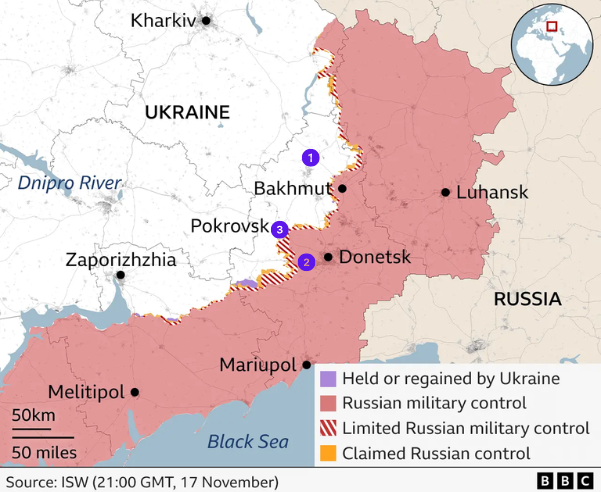
Bread on the Frontline: The Pokrovsk Chapter
During the first months of the full-scale invasion Maryinka, where Tkachenko lived, was heavily bombed. So in spring 2022, Tkachenko moved again, this time from Maryinka to Pokrovsk, a relatively safer town about an hour away, and moved the bakery with him. Thanks to a large bomb shelter beneath the bakery, production continued for almost a month despite being just 600 meters from the frontline.
“Unfortunately, when we were running from [Maryinka], we had to leave our ovens and other big equipment there. We had to move fast and couldn’t load any big equipment on the truck. But good people helped us to buy new one, including the appliances, which we didn’t have before”, Tkachenko remembered.
For over 2 years, from June 2022 to August 2024, the bakery in Pokrovsk produced and distributed hundreds of thousands of loaves of bread and litres of drinking water. Until they had to run away. Again.
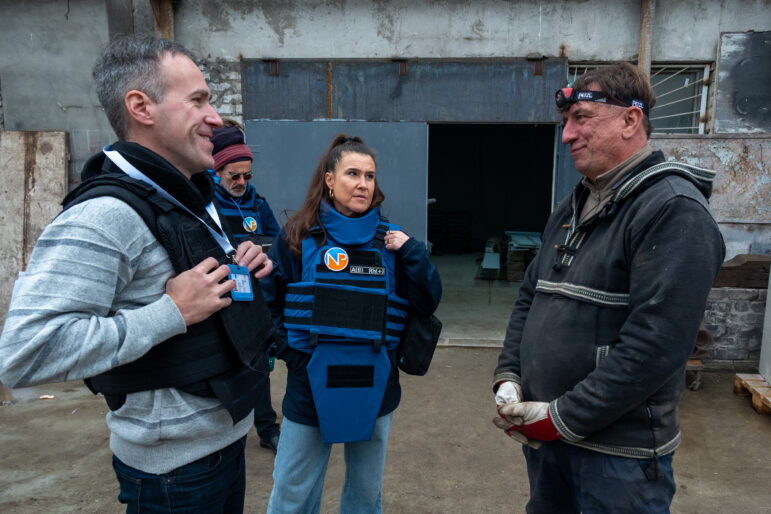
Evacuation from Pokrovsk
“All buildings around our bakery were destroyed. Russian drones were flying all the time, we had problems with electrical supply, surely. At some point I got a call from my friend who advised me to leave Pokrovsk. Later, a few more friends called and persuaded me to go back to Slovyansk”, the chaplain shared. Back to Slovyansk, where Tkachenko had started his moves 10 years ago.
One of these friends is Matouš Blaha, a Czech humanitarian worker, head of the NGO Koridor UA. The organisation, a partner of NP’s Odesa office under the “Fuel and Stipend” program, supported some of the bakery’s relocation efforts. In 2024, NP provided subgrants to cover fuel and volunteers’ stipends to 19 NGOs. These funds allow the group to carry out essential activities, such as evacuations or aid distribution. For Tkachenko and his family that meant the difference between living under occupation and possible death from bombing, or continuing resilience in Slovyansk.
Related: The Impact of the Volunteer Resilience Programme: Irina’s Story
Blaha shared, “We decided to [support Tkachenko’s evacuation] when the Russians got to about 10 kilometres from Pokrovsk. A friend of mine who serves in the army warned us that than Pokrovsk may be lost sooner or later, and that we should think about the evacuation. We started the process immediately, but it took us three trips. —on August 9–11, August 28–29, and September 13–14, 2024.”
Rebuilding Again: A Bakery and a Resilient Mission During War
Tkachenko, Blaha and his Czech colleague Petr Pojman tried to grab every equipment they could. But it was impossible to take everything, the chaplain said. Now they are fundraising €60,000 to rebuild the bakery in Slovyansk.
Blaha admits that it's possible Tkachenko will need to move the bakery again in a year or two, but notes that his support is not about the bakery itself, but about resilience in the face of war.
“We didn't come there to die, so we don't think about it. We come to help and trust people around. That's why I’m listening to people, when they call for help, I assimilate with their needs and risks like it is my own. Also, this is the reason why I don't judge [Tkachenko] for evacuating to Slovyansk, not further from the frontline", Blaha said.
Beyond producing and distributing bread for those in need, Tkachenko also evacuates the civilian population in the frontline villages and towns. One of his latest extraction points was Vuhledar—a town heavily shelled and later captured by Russian army in October 2024. Together with other local humanitarian workers they evacuated thousands of people from Vuhledar.
“Only about a hundred people stayed there out of 17 thousand. If I had more time, I would persuade ten out of this hundred. I know how to reassure people”, he said.
Despite the challenges, Tkachenko continues to rebuild. The bakery in Slovyansk now features equipment he never had in Pokrovsk or Maryinka. His family plays a critical role—his wife works alongside him at the bakery, and his eldest daughter joins him on evacuation missions. Tkachenko, a father of five, remains resolute in his mission.
